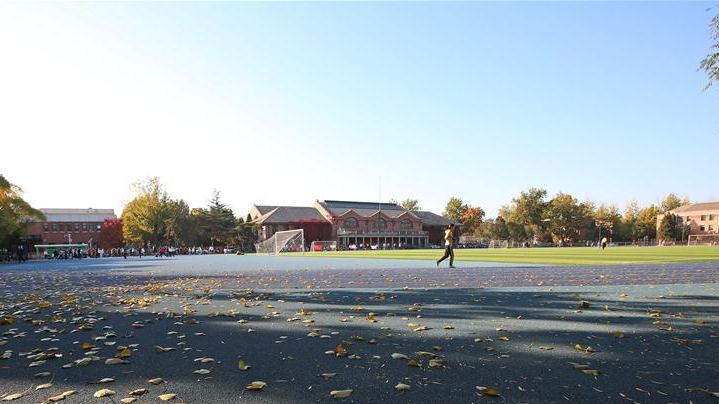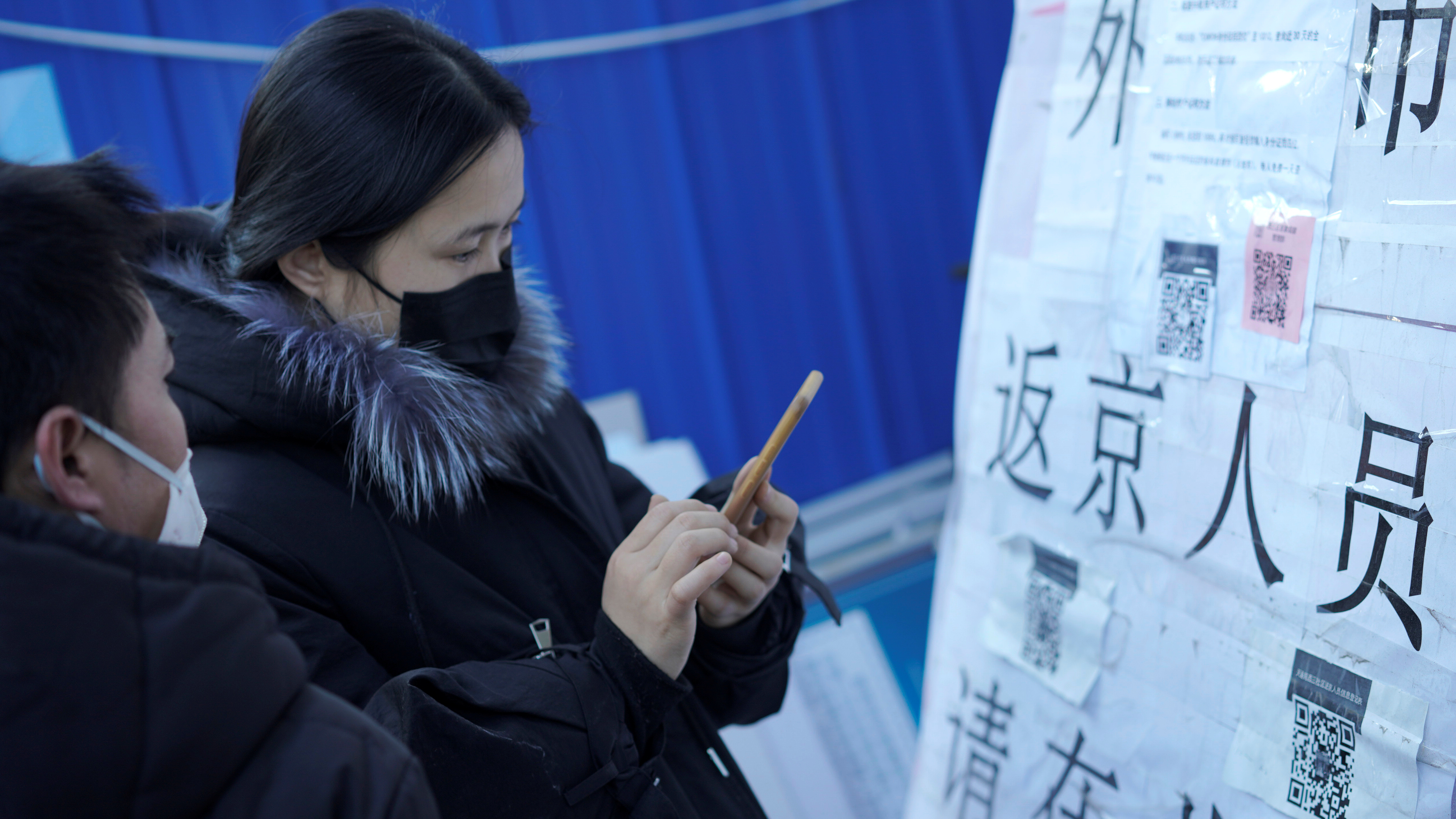
Students do exercises on the playground at Tsinghua University in Beijing, capital of China, November 7, 2019. /Xinhua
Students do exercises on the playground at Tsinghua University in Beijing, capital of China, November 7, 2019. /Xinhua
Editor's note: Qiu Yong is the President of Tsinghua University, China. The article reflects the author's views and not necessarily those of CGTN.
COVID-19 has caused worldwide disruption, at all levels of education. According to UNESCO's statistics dated March 26, more than 165 countries have implemented nationwide school closures, impacting 87 percent of the world's total enrolled learners. Many universities closed campuses and moved courses online. And this is indeed unprecedented.
China was the first country attacked by the COVID-19 outbreak, and the first that announced local and national school closures. After deliberate consideration, on January 30, we in Tsinghua University also decided to start our spring semester courses online – on time and on schedule. And we have received active response and support by our faculty and students.
A question then emerged in my mind was: What is a university?
As we face the unprecedented global challenge, it is time to reflect on what makes a university great. Great universities should proactively respond to the challenges and shoulder responsibilities to demonstrate their commitment to the society. And I will illustrate my point using Tsinghua as an example.
The essence of education is to empower the lives of students, with a prerequisite of ensuring their health and well-being
Universities should take the safety and health of students, faculty and staff as their top priority. In Tsinghua's case, after the COVID-19 outbreak, we took immediate action and made a campus safety plan in accordance with our emergency response framework.
On January 23, the city of Wuhan went into lockdown. On the same day, Tsinghua established 13 epidemic prevention task forces. We managed to maintain contact with every single student, faculty and staff of Tsinghua community. No one was left behind.The university's hospital initiated emergency plans and set up fever clinics. Campus security level was reinforced by applying strict restrictions on visitors and vehicles. Buildings were disinfected multiple times a day.
Teaching and learning should not be undermined under any circumstances
University education is a well-designed systematic program with comprehensive planning. Online teaching and learning is not supplementary for our education. In Tsinghua we have been trying our best to ensure that online courses have the same quality as in-person ones.
As of February 17, Tsinghua commenced teaching for all courses via Tsinghua’s independently-designed online learning platform, Rain Classroom, among some others. Through Rain Classroom, slides can be synchronized with WeChat – a popular messaging and social media app in China. Students take quizzes during the class, send their feedback and questions anonymously via the on-screen comments section.
Professor William Rosoff from the School of Law in Tsinghua University, delivered his online class from Indonesia. He noted that the system exceeded his expectations. Even though classes conducted over various time zones created challenges for international students who sometimes had to log in at midnight, students like Ana Paula Perrone Kaszner, first year graduate student from the Global Environmental Leadership Program, who has been taking online courses from her hometown in Brazil, believe it was overall a very good experience and a good solution.

People wearing masks scan a QR code to submit their information as they return to Beijing, at an entrance of a residential compound, as the country is hit by a novel coronavirus outbreak in Beijing, China March 1, 2020. /Reuters
People wearing masks scan a QR code to submit their information as they return to Beijing, at an entrance of a residential compound, as the country is hit by a novel coronavirus outbreak in Beijing, China March 1, 2020. /Reuters
Drawing on traditional strengths in academic research and innovation, universities can play an essential role in epidemic-prevention efforts
Modern universities are characterized by academic research and innovation, and have made indispensable contributions to the well-being of humankind. Based on the traditional strength in science and technology, Tsinghua swiftly initiated COVID-19 research projects. Substantial progress has been made in basic medical research, vaccine research, fast testing kits, as well as intelligent epidemic prevention systems and equipment.
On March 2, President Xi Jinping visited Tsinghua to inspect the School of Medicine's research projects on COVID-19. During his visit, President Xi emphasized that "science and technology are the most powerful weapon in humanity's battle against diseases."
For example, professor Cheng Jing's research group from the School of Medicine successfully developed the Respiratory Virus Nucleic Acid Detection Kit (Isothermal Amplification on Disk Chip), the first in the world to detect six types of respiratory virus simultaneously, providing patients with quick and accurate diagnosis. Soon after the approval from the National Medical Products Administration, the detection kits have been donated to Hubei province and the government of Georgia in Europe.
Once the genome sequence of COVID-19 became available, the research group led by Professor Zhang Linqi from the School of Medicine initiated vaccine strategies to block the "key and lock" interaction and to identify potent neutralizing antibodies from infected and convalescent patients.
Universities demonstrate the aspiration of education by taking on social responsibilities
In May 2019, Global Alliance of Universities on Climate (GAUC) was officially established at Tsinghua University, with 12 universities from nine countries as founding members. Similarly, we believe that universities can also make indispensable contributions in the fight against COVID-19.
For example, since the outbreak of COVID-19, Tsinghua opened a series of online resources to the public, including more than 1,900 massive open online courses (MOOC) on XuetangX, China's first and largest MOOC platform initiated by Tsinghua.
In addition, more than two million epidemic prevention items have been donated to Hubei Province and other regions through Tsinghua University Education Foundation.
In late January, a team of medical workers from Beijing Tsinghua Changgung Hospital, some of whom had clinical experience of SARS, accepted the call to join the front lines in Wuhan to treat COVID-19 patients. Thousands of Tsinghua volunteers organized a diverse range of activities to support epidemic prevention efforts, such as providing free tutoring to children of medical workers on front lines, donating blood and conducting volunteer work in local communities.
Universities serve as the lighthouse of human civilization inheriting knowledge and culture, as well as educating young talents. We share a common objective, which is to make the world a better place. At this critical moment, universities should play an essential role in promoting confidence, trust and unity among people, and collectively call for humanity to rise to its highest potential. Despite the uncertainties and challenges that lie ahead, there remains hope for a brighter future. Together, Stronger.
(If you want to contribute and have specific expertise, please contact us at opinions@cgtn.com.)